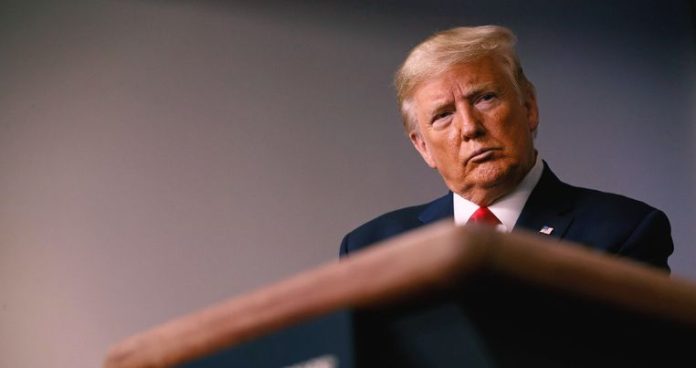The former President of the United States, Donald Trump has been facing an imminent arrest on charges stemming from an investigation into a 130,000 USD payment he allegedly made to adult film actress, Stormy Daniels, in 2016. Indicted by a grand jury in New York, Trump has become the first former US President to face criminal charges.
The exact charges have not yet been disclosed, but reports suggest that they are related to the payment made to Daniels. This is a significant development in the ongoing investigation into Trump’s alleged wrongdoings during his time in office. Trump has repeatedly denied all allegations and dismissed the investigation as a politically motivated witch hunt.
The news of the impending arrest has sent shockwaves through the political world, with many wondering how the case will unfold. Here are the answers to some key questions regarding this case.
What is Donald Trump Accused of?
The tantalizing tale of an affair between a president and a porn star captivated the world in 2016, when Daniels, offered media outlets a juicy account of her alleged extramarital tryst with Donald Trump back in 2006. Upon discovering Daniels’ offer, the former President’s legal team took action, and Trump’s attorney, Michael Cohen, reportedly paid 130,000 USD to silence her.
While not technically illegal, things got dicey when Trump reimbursed Cohen for the payment, falsely labelling it as a legal fee. Prosecutors contend that this amounts to Trump tampering with business records, a misdemeanour under New York law. Moreover, some legal experts believe that Trump concealing his affair could also constitute a violation of election law, as he tried to hide the payment from voters. If proven, this could lead to felony charges.
One strong indication that the payment to Daniels was linked to politics is the timing. The money was sent to Daniels’ lawyer on October 27, 2016, only a few days before the presidential election. However, this is far from an open-and-shut case, as there is little precedent for prosecuting such offences, particularly against politicians. Previous attempts to charge politicians for blurring the line between campaign finance and personal spending have often ended in failure.
What Challenges Can Prosecution Face?
It is hard to judge the case against Trump without knowing all the charges and evidence prosecutors have gathered during their investigation that has lasted over four years. Based on the information available to the public, legal experts have identified some obstacles that could make it challenging for prosecutors to obtain a guilty verdict.
One challenge is that Michael Cohen, who has provided much of the evidence and testimony, may not be the most reliable witness since he has been found guilty of several crimes and has shown bitterness towards Trump.
Another issue is that the case dates back to 2016 and 2017, so it is quite old, and Trump could argue that prosecutors waited too long to bring the case against him. Additionally, prosecutors may have to prove that Trump knew that the payments were illegal, which could be hard to do since Trump could argue that he thought Cohen was handling everything legally as his attorney.
How Hard Will It Be to Imprison Trump?
It will certainly take a long time to start the trial of a former US president. Even if both sides want to move fast, legal and constitutional questions will take a year to sort out, and Trump may try to delay the proceedings. Furthermore, his lawyers can also try to move the case to federal court, change the location of the trial, or dismiss the indictment. These pre-trial motions will take time to resolve. An example is the 2021 criminal tax case against the Trump Organization which took nearly 15 months to get to trial in the same court.
If Donald Trump is charged with a crime, he may negotiate with prosecutors to enter the court privately instead of in front of the media. Once inside, he would be treated like any other criminal defendant, including being fingerprinted, having his photo taken, and being read his rights. He may be handcuffed temporarily, but his lawyers will try to avoid that. Secret Service agents will be with him throughout the booking process. He will wait in a holding area or cell until his arraignment, which is open to the public.
The timing of the trial and any travel restrictions or bail requirements will be determined by the judge. If convicted of a misdemeanour, he would face a fine, but if convicted of a felony, he could face up to 4 years in prison, though legal experts think a fine is more likely than a prison sentence.
Can Trump Still Run for President after Indictment?
If Trump is indicted or convicted of a crime, he can still run for president and serve in that position, even if he’s in prison. However, being arrested would create problems for his campaign. It may cause some Republican supporters to back him more, but it would be a distraction and could increase political division.
Conservatives feel that Trump is being treated unfairly, while liberals think it’s important to hold law-breakers accountable.
What Would it Mean for Other Ongoing Investigations against Trump?
The indictment in Manhattan may not affect the other ongoing investigations into Trump, which could lead to additional criminal charges. There is a grand jury in Fulton County, GA looking into his attempt to overturn the election results, and special counsel Jack Smith is leading two federal probes into Trump’s role in the Capitol attack and his handling of government documents after his presidency.
If a federal criminal case against Trump is filed, it would take precedence over any local cases, giving federal prosecutors more control. Although concurrent criminal proceedings may cause some logistical challenges, federal and local prosecutors typically cooperate to resolve any conflicts.


